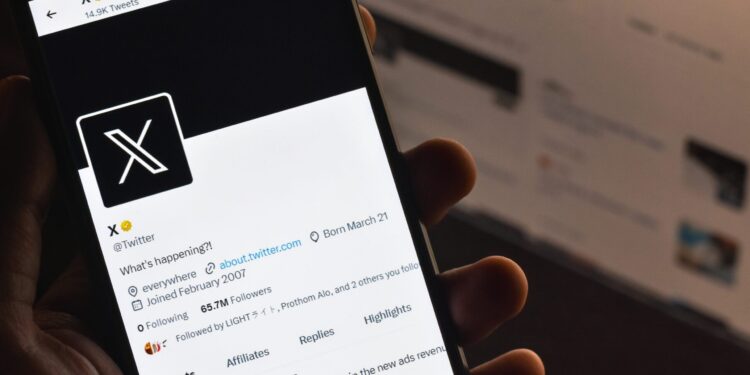X Is Becoming a Drag on the GOP
The platform rewards worthless and increasingly niche content.

When Elon Musk purchased Twitter in December 2022, conservatives celebrated with unmitigated jubilation. Twitter, which had engaged in systematic censorship and deplatforming, arm in arm with malicious actors in the intelligence community, presented a unique and unprecedented threat to American free speech and expression. Some of those threats, particularly the censorship of the New York Post’s Hunter Biden coverage, were potentially election-deciding. For conservatives incensed by Big Tech’s direct intervention in the American electoral process, Musk’s $44 billion Twitter acquisition felt like a long-overdue and much-needed victory.
It was thrilling to watch Musk follow up on his victory with acts of petty justice. He fired large swaths of Twitter’s workforce—employees who seemed to harbor personal loathing for the Republican electorate and their leader, President Donald Trump. Musk restored previously banned accounts, including Trump’s, and pledged to publish the site’s algorithm, which he did in 2023. His moment of triumph was perhaps best symbolized by the now-infamous “sink” stunt—his way of telling the world, “Let that sink in.”
Nearly three years later, however, despite great satisfaction with justice dealt and the restoration of unfairly censored voices, it’s difficult to argue that Elon Musk’s X has enhanced conservative—and by extension, American—discourse. Generally, there’s more evidence that conservative discourse has been fundamentally degraded. While media reports on rising hate speech on X are often exaggerated or alarmist, the reality is that, more than ever, X is a platform where “crap is king.” Musk’s algorithm punishes external links, undermining the business models that promote long-form content creation. This ostensibly reduced clickbait, but has turned the platform into a shock-jock factory, rewarding shallow, attention-grabbing content that effectively serves as a one-for-one replacement for clickbait. Influencers are now locked in an arms race for views, driven by a pay-per-view incentive structure that has degraded the quality, reliability, and depth of information—especially in the chaotic “For You” section.
This influencer-driven frenzy has already shaped the 2024 election. The immigration debate, once focused on the southwestern border, has shifted to Springfield, Ohio, where locals claim Haitian migrants are, as Donald Trump put it, “eating the dogs, eating the cats.” The pet-eating narrative, which subsequently defined the first presidential debate between Trump and Vice President Harris, was concocted on X. Tucker Carlson, whose hit podcast now resides on the platform, added to the GOP’s messaging chaos by hosting a guest who labeled Winston Churchill the “chief villain” of the Second World War and questioned the merits of the Allied cause. While provocative, this sort of misstep from a campaign surrogate in the days before early voting began in Pennsylvania was hardly productive.
As The American Conservative’s own Scott McConnell recently pointed out in an excellent piece, neither presidential campaign has managed to build momentum or secure a sustainable lead in the polls. He astutely highlights the Trump campaign’s lack of message discipline, which has squandered key moments that should have shifted the race. This seeming inability of the right to maintain a coherent message—even in the wake of multiple assassination attempts—may partly reflect Trump’s personality, but it increasingly mirrors the influence of X’s content model. Even Trump’s posts, once renowned as 240-character works of comedic brilliance, have lost their luster. They have morphed into multi-paragraph screeds. Brevity, even for Donald Trump, is the soul of wit.
I could be wrong about the impact this message fragmentation will have on the election; I certainly hope that I am wrong. It’s possible that a firehose of content can act as some sort of marketing blitzkrieg, and that quantity can truly outstrip quality. But one does worry that Republican messaging has become a little bit too “online” when the Arizona GOP places contextless billboards instructing voters to “eat less [sic] kittens” right off the swing state’s interstate. Not to mention another party-funded billboard that features Elon Musk’s photo, but not that of Arizona Senate nominee Kari Lake.
The fact is that most American voters remain—rightfully—squarely in the “normie” camp. I enjoy scrolling on X as much as the next politico, but the platform is generally incomprehensible or frightening for most Americans, especially older Americans. The issue set promoted and discussed on the site may percolate out to a wider audience, but it’s often received without necessary context and winds up making the discussing parties appear, for lack of a better term, weird.
Yes, hyper-informed Zoomers will scroll long enough to find out that Springfield, Ohio’s city manager did, in fact, receive reports of Haitian animal sacrifices. An equally large, if not larger, subset of voters will scratch their heads in confusion and wonder if conservatives have lost their minds. It’s a fundamental disconnect in information diets that has come to define our politics, but ultimately, political campaigns are responsible for meeting voters where they are, not where they’d like the voters to be. The legendary GOP consultant Lee Atwater famously remarked that “perception is reality.” Voters who aren’t scrolling X perceive some degree of weirdness, creating a reality that GOP campaigns across the country are being forced to confront.
At its worst, X is beginning to render evidence for some of the sensational accusations levied against the right in recent years. Anybody who has spent any time on the platform has noticed the near-ubiquity of generally distasteful content. This includes racist content, which seems to be supercharged by the algorithm preference system for some reason or another. I’m not going to pearl-clutch about the efficacy of hosting that sort of content, but I will note that it’s a turn-off for the decent-minded people that make up the vast majority of the American electorate. When Elon Musk is so closely associated with the conservative movement, the conservative movement is rendered responsible for the ongoings of his algorithm.
The election looks like it’s going to be another nail-biter, and given the last decade’s egregious polling misses, no serious observer can claim to have a wholly accurate read on the race. The United States is suffering from a deep, unyielding malaise. This creates political gravity that might prevent Vice Kamala President Harris from winning the Oval Office. But regardless of the outcome, it’s likelier than not that X’s pay-per-view model has damaged the coherence of the Republican Party and its message. If Harris is able to squeak out an unlikely victory, X’s influencer rat-race might be identified as a cause of failure during the electoral post-mortem.
The post X Is Becoming a Drag on the GOP appeared first on The American Conservative.

































